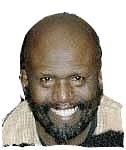'The first question you get, is 'Is it a black film?' All of them agree, it's not going to do good in Europe, it's not going to do good in Japan .
'Somebody has to prove that to be a lie!', he said. 'Maybe I'll have the chance to prove it.
'
Brothers & Sisters International (BASI) Friends of the Congo (FOTC) Community Action Project (CAP) Anti-Apartheid Movement USA (AMUSA) The Universal Negro Improvement Association (UNIA-ACL)
3536 Minn. Ave., Suite 200
Washington DC 20019
(202) 232-8936
broandsisinterna@aol.com
Cell: (301) 257-6157

In July of 2006 Mr. Pumphrey represented FOTC as an international observer to the DRC first held national election in forty years.
In 1998, Mr. Pumphrey co-founded Brothers and Sisters International (BASI) as is economic development and human rights in the
As the international liaison for BASI, Mr. Pumphrey develops working relationships with grassroots organization in the
In
Mr. Pumphrey’s community activism in
Mr. Pumphery’s political work spans over four decades. In 1968, ‘78, ’83 and ‘88 Mr. Pumphrey was a deputy coordinator of crowd control for the Southern Christian Leadership’s (SCLC) Marchs on
In 1975, Mr. Pumphrey became the co-founder and national organizer of the Anti-Apartheid Movement USA (AMUSA). AMUSA was one of the first organizations to provide educational programs about apartheid on university campuses, high schools, and in community organizations. AMUSA worked with the liberation movements in southern
Mr. Pumphrey is also an effective union organizer. He was shop steward and member of the executive board of the American Federation of State, County and Municipal Employees Local 2093 (AFSCME), a union in Washington, D.C. Mr. Pumphrey also helped organize unemployed steel workers in Pittsburgh in the early 1980’s. In 1972, Mr. Pumphrey became a union organizer for the United Farm Workers Union in the state of
Early in his career, Mr. Pumphrey founded the Summer Fun Day Camp which was devoted to serving the needs of youth-at-risk in
Mr. Pumphrey is a member of Universal Negro Improvement Association, UNIA Division 330.
No comments:
Post a Comment